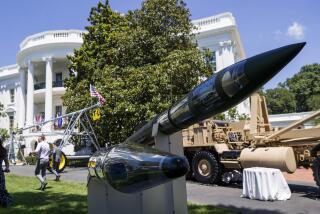More U.S. Troops Ordered to Gulf : Mideast: Pentagon sources say new reinforcements could number more than 100,000.
- Share via
WASHINGTON — President Bush said today that he has ordered a new wave of U.S. troops to the Persian Gulf area to give the multinational military force there an “adequate offensive military option should that be necessary.”
The President’s announcement at a White House news conference did not specify how many more American forces will be added to Operation Desert Shield, but Pentagon sources said it could be more than 100,000.
The sources said the extra troops will include armored divisions from U.S. bases in Germany and possibly from the United States.
Bush said he does not need to get U.N. approval to launch a military action against Iraq but indicated that the Administration will first seek out that support.
“Yes, we have the authority but we’ve been great believers in going to the United Nations,” Bush said in a question-and-answer session after his announcement.
Bush said he still holds out hope that the confrontation over Iraq’s invasion and occupation of Kuwait can be settled short of war. But he also said he wants to give the American ground commander in Saudi Arabia, Gen. H. Norman Schwarzkopf, a credible offensive option.
“I would love to see a peaceful resolution to this question and that’s what I want,” the President said as Defense Secretary Dick Cheney stood nearby.
The Soviet Union today again gave its qualified approval to the use of military force to push Iraqi occupiers out of Kuwait if peaceful measures fail.
Secretary of State James A. Baker III came to Moscow seeking at least Soviet acquiescence to the Bush Administration’s intention of having the U.N. Security Council authorize the use of force to liberate Kuwait as a last resort.
“Whether or not the use of force could be ruled out--probably this could not be ruled out--and a situation may emerge which effectively would require such a move,” Soviet Foreign Minister Eduard A. Shevardnadze said after talks with Baker.
Shevardnadze stressed that any decision to use force against the Iraqis should be taken by the United Nations. “We should not doubt the ability of the Security Council to take wise and mature decisions,” he said.
Baker also met with Soviet President Mikhail S. Gorbachev at his official country residence outside the city and had sessions with Shevardnadze before and after that meeting.
Meanwhile today, it was learned that Saddam Hussein has dismissed his military chief of staff for opposing the occupation of Kuwait and analysts said the move indicates growing dissension in his armed forces hierarchy.
The Iraqi army’s Al Qadissiya daily reported that Lt. Gen. Nazir al Khazraji, chief of staff since 1985, has been replaced by Gen. Hussein Rashid, commander of the elite 120,000-strong Republican Guards force.
The newspaper did not say what happened to Khazraji or when he was dismissed.
But several Western military and intelligence sources said Khazraji had opposed the Kuwait occupation. They also believe that Hussein may be seeking to surround himself with relatives and loyalists as the standoff with the multinational gulf force enters its fourth month.
A Western intelligence source said Rashid is a hard-liner in Iraq’s Baath Socialist Party who would be expected to support Hussein’s policies. Rashid had been Khazraji’s deputy chief of staff for operations.
U.S. officials in Washington said Rashid is considered a “very competent” commander who led an armored brigade in the 1980-88 war against Iran.
“It’s very ominous,” said Hans-Heino Kopietz, a former analyst with London’s International Institute for Strategic Studies who is now with Control Risks, an international security firm in London.
“Khazraji’s dismissal now is indicative of some opposition to (Hussein) within the military,” Kopietz said.
More to Read
Get the L.A. Times Politics newsletter
Deeply reported insights into legislation, politics and policy from Sacramento, Washington and beyond. In your inbox twice per week.
You may occasionally receive promotional content from the Los Angeles Times.










